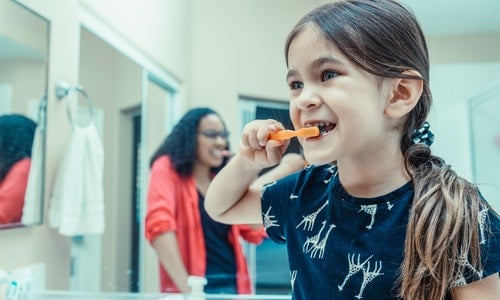When it comes to choosing the right toothpaste, the number of options can be intimidating. There are various flavors, different formulas for different needs, and even some labeled specifically for kids. But is there really a difference between kids’ toothpaste and adult toothpaste besides the fun colors and characters on the packaging? Your pediatric dentist in Prairie Village knows the truth.
Fluoride Content
The main difference between adult toothpaste and toothpaste designed just for kids is the amount of fluoride they contain. Fluoride is found naturally in many foods and is often added to public water sources. It’s also one of the best ways to protect both permanent and baby teeth from decay. Children’s toothpaste typically has less fluoride to help kids from getting too much of it. When kids are exposed to too much fluoride, their teeth may form little white spots known as fluorosis.
More About Fluorosis
Fluorosis occurs while teeth are still forming below the gum line, so it’s important to monitor the amount of fluoride your child is getting to help avoid getting those white, streaky spots. Even if fluorosis does occur, don’t panic. It’s not usually harmful and can be treated.
When to Start Using Toothpaste
Taking care of your child’s oral health can and should begin early, but the use of toothpaste should wait until their tiny teeth start to erupt. Until then, gently rubbing his gums with a wet, soft cloth will work well.
According to the American Academy of Pediatric Dentistry (AAPD), you can start using fluoride on teeth as soon as they start to appear. However, your adult toothpaste probably has too much fluoride, so make sure you choose a toothpaste that is designed for kids. Use a tiny smear of low-fluoride toothpaste in kids under 2 with a toothbrush sized appropriately for tinier mouths.
As kids get older, you can start to increase the amount of toothpaste they use. Between ages 2 and 5, a pea-sized amount of kids’ toothpaste is appropriate. Remember, your child will still need your help brushing properly and spitting the leftover paste instead of swallowing. Around age 6, talk with your pediatric dentist in Prairie Village to see if it’s time to switch your child to an adult toothpaste.
No matter how old your child is or what toothpaste they’re using, it’s always important to brush twice a day, early and at night, to ensure a healthy mouth. Also, don’t forget to visit a pediatric dentist at least twice a year for regular checkups.
If your little one needs a dentist, we’d be happy to see him at our Prairie Village pediatric dental office. Give us a call to schedule his visit today!
We’re always welcoming new patients from Johnson County and the Kansas City area at all of our pediatric dental offices in Overland Park, Prairie Village, Olathe, Kansas City!
